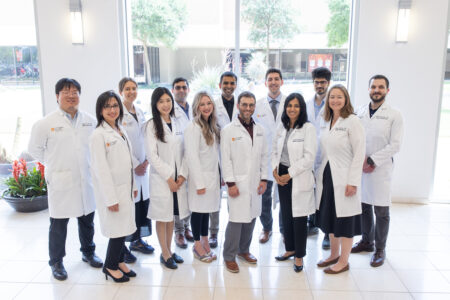Clinical Rotation
The patient is the center of our universe, and we emphasize strong clinical skills, attention to detail, and the development of outstanding communication skills and professionalism as we care for people with blood disorders and cancer. Patient care spans the spectrum of prevention, diagnosis, treatment, follow-up, and effective palliative care and end-of-life care. We strongly support clinical trials as the best option for quality care of patients with cancer and hematologic disorders. The clinical experience will include general inpatient and outpatient consultations on oncologic and hematologic problems, and specialized experience in the management of intensively treated, critically ill cancer patients on inpatient oncology and hematology units.
The first year of fellowship consists of clinical rotations. All the clinical rotations described below are one month in length and may be done once or twice.
Inpatient Rotations
Inpatient Medical Oncology – This is a month-long rotation of the medical oncology service with a second or third-year resident. The team consists of residents, medical students, and pharmacists. The fellow on the service helps direct the oncology care, sees the consults related to patients with cancer or suspected cancers, and is responsible for teaching attending rounds once a week to resident and students. At the end of this rotation it is expected that the fellow will have a better appreciation of inpatient oncology, hospice and palliative care, and further enhance their skills as a teachers.
Inpatient Malignant Hematology Service – The fellow on this service develops expertise in handling patients with malignant hematological disorders, such as acute leukemias, and lymphomas. The fellow develops procedural skills that are needed such as review and interpretation of blood smears and bone marrow biopsies, and intrathecal chemotherapy. At the end of the rotation is expected that the fellow will have a better appreciation for malignant hematology, particularly leukemia and lymphoma, and will also have enhanced teaching skills.
Bone Marrow Transplantation Service – The bone marrow transplant (BMT) service at the Audie L Murphy V A Hospital is primarily an inpatient rotation with the attending on the bone marrow transplant service. The fellow is responsible for the day to day management of the patients on the bone marrow inpatient service in partnership with the BMT team. At the end of the rotation it is expected that the fellow will have a better appreciation of indications for bone marrow transplantation, acute and chronic toxicities, and pre and post-transplant follow-up of patients. An elective rotation is also offered at the Adult Blood and Marrow Stem Cell Transplant Program at the Methodist Hospital and Texas Transplant Institute.
Hematology Consult Service – The Hematology consult service covers hematology consults throughout the hospitals. There are regular rounds, and exceptional conferences with faculty and colleagues in hemato-pathology. At the end of the rotation it is expected that the fellow will be proficient in the clinical management of complex benign and malignant hematological disorders.
Outpatient Months – The outpatient rotation varies in length. The fellow rotates through a variety of clinics that deal with hematologic and malignant diseases. Our clinics include benign and malignant hematology, thoracic oncology, breast oncology, neuro-oncology, melanoma, gastrointestinal oncology, genitourinary oncology, geriatric oncology, head and neck oncology, and experimental therapeutics and clinical trials evaluation and follow-up clinic. At the end of the outpatient rotations the fellow will have a much better understanding of the variety of outpatient benign and malignant diseases.
Continuity Clinics – The first year fellow has two continuity clinics, one of the clinics in the first year is hematology, and the other clinic consists of a variety of solid tumors. In the second and third years, fellows have continuity clinics but the number of clinics depends on their career goals and research focus.
Elective Rotations – Elective rotations include geriatric oncology, experimental therapeutics, gynecologic oncology, radiation oncology, palliative care, transfusion medicine, hemostasis and thrombosis, and hematopathology, genetics, and others.

